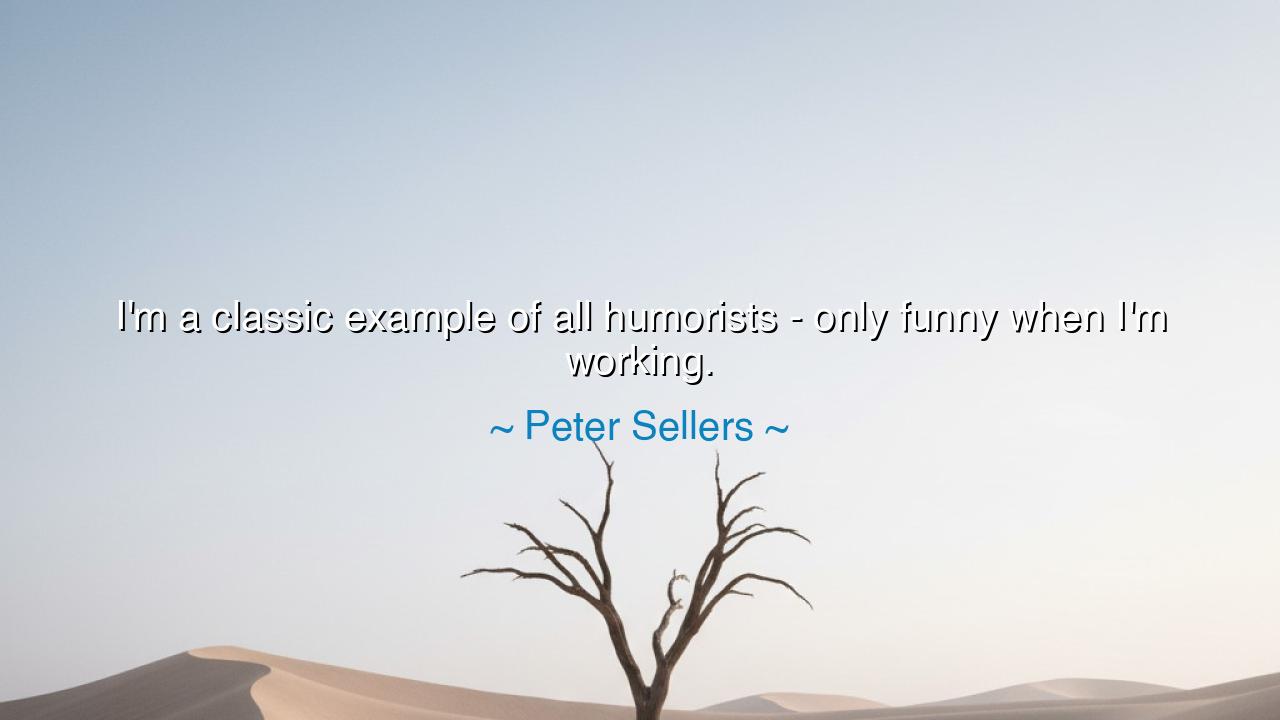
I'm a classic example of all humorists - only funny when I'm






In the haunting words of Peter Sellers, “I’m a classic example of all humorists — only funny when I’m working,” there lies a paradox as deep as the human soul itself. The man who made millions laugh confessed that his laughter, in truth, was a mask — a garment worn for the stage, a light that flickered only beneath the weight of performance. In this humble yet piercing statement, Sellers unveils the eternal conflict of the comedian’s heart: that the bringer of joy is often pursued by sorrow, that the one who summons laughter in others must sometimes descend into silence alone.
This truth, ancient as the theater itself, speaks of the double life of the artist — the mask and the man. In the arena of life, the humorist stands like a priest of mirth, conjuring light from darkness, weaving smiles from the thread of pain. But when the curtain falls and the laughter fades, the mask grows heavy. The same sensitivity that gives the artist their power to amuse also grants them the curse of feeling too deeply. Thus, when Sellers said he was “only funny when working,” he was not lamenting, but revealing the sacred cost of creation — that to awaken joy in others, one must burn one’s own candle to its base.
Consider the tale of Democritus, the ancient philosopher whom history remembers as “the laughing sage.” He wandered the streets of Abdera laughing at the follies of mankind, yet within him burned the knowledge of mortality and decay. His laughter was not mockery but mercy — a shield against despair. Like Sellers, Democritus laughed not because life was easy, but because he had looked into its abyss and chosen to rise above it with mirth. Such is the way of the true humorist: their laughter is not shallow sound, but alchemy — the transmutation of pain into joy.
And so we learn that humor is not born of comfort, but of conflict. The comedian is a warrior of spirit, battling darkness with jest. Sellers’ life itself mirrors this truth — a man of many faces, from the bumbling Inspector Clouseau to the haunting roles of Dr. Strangelove, he poured himself into each creation until little of the man remained behind the art. He once said he had no real personality of his own, only the ones he borrowed for performance. Thus, his humor became his survival — his way of existing, if only through the lives he invented.
This, too, is the tragedy and triumph of the creative soul. The laughter we hear upon the stage is not always born of happiness but of transcendence — the soul’s refusal to be defeated by its sorrow. When Peter Sellers confessed that he was only funny when working, he was telling us that creation gave him life, that through his craft he touched the divine. To make others laugh is to momentarily bridge the chasm between loneliness and belonging, to give joy while one’s own remains uncertain. It is a form of grace, and also of sacrifice.
Let us remember also the tale of Robin Williams, another master of joy who bore a similar wound. His humor, like Sellers’, was a flame bright enough to warm the world, yet fragile enough to consume him. In both men, we see the eternal paradox of the artist — that the ability to awaken laughter in others does not guarantee peace within oneself. Yet their work reminds us of a higher truth: that even sorrow, when offered selflessly, becomes sacred.
So what then shall we learn from this? That laughter is holy, but it must be balanced with care. Those who bring light to others must also guard their own flame. The humorist’s gift is not a curse unless it is forgotten that behind the mask must live the man — that behind performance must dwell presence. Sellers teaches us to look beyond the surface of joy, to see the humanity within those who make us smile. And for those who bear heavy hearts, he reminds us that even in the act of working — of creating, of serving, of giving — there is redemption.
Therefore, take this teaching to heart: do not hide from the world behind laughter, but let your laughter be rooted in truth. Work, yes — pour your spirit into your craft, as Sellers did — but when the work is done, step out from behind the stage and tend to the soul that made it possible. For humor, when wedded to honesty, becomes more than entertainment — it becomes healing. And as Peter Sellers’ words echo through time, they remind us that even the quiet soul behind the mask is worthy of love, of rest, and of light.






AAdministratorAdministrator
Welcome, honored guests. Please leave a comment, we will respond soon